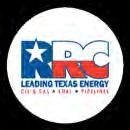YEAR IN REVIEW 2024

RAILROAD COMMISSION OF TEXAS







As the oldest regulatory agency in the state of Texas, the RRC extended its legacy of strong environmental stewardship and commitment to public safety in 2024, while also ensuring the agency is geared for the future.
Our annual Year in Review publication showcases all the great work the RRC has accomplished in the past year as we look ahead to regulating a burgeoning energy industry in the state.
Stories include RRC’s framework for pilot programs to recycle produced water that could lead to the potential to re-use produced water safely and economically; how the agency improved efficiency for both staff and operators with the launch of State Tracking and Reporting (LoneSTAR) earlier this summer; and the Commission’s process of updating rules regulating waste management facilities with its first overhaul of these regulations in 40 years.
This year the RRC also adopted rules to administer new laws in geothermal energy. Geothermal energy regulation is one of many ways the RRC will stay at the forefront of dynamic innovation in the energy sector.
In our agency’s ongoing commitment to increase access to important information, RRC staff successfully digitized more than 15 million records over 12 months, now providing the public with online access to more than 83 million oil and gas records dating back to the 1930’s.
Our public outreach has expanded even more from last year, as we attend large and small events and venues to help educate Texans about our important work regulating energy. Outreach is very important as more people flock to the state!
This publication also highlights statistics that reflect the day-to-day success of RRC staff across various divisions in serving Texas!
The 2024 Year in Review starts off with our three Commissioners’ reflections of the past year.

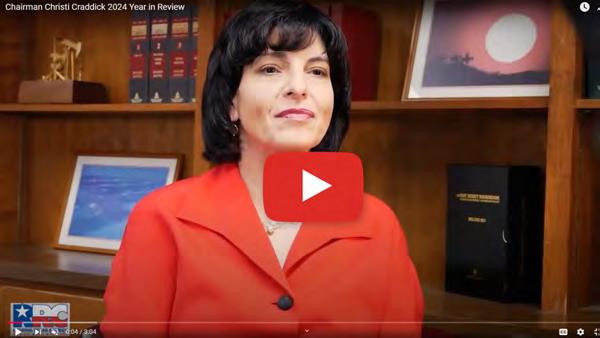
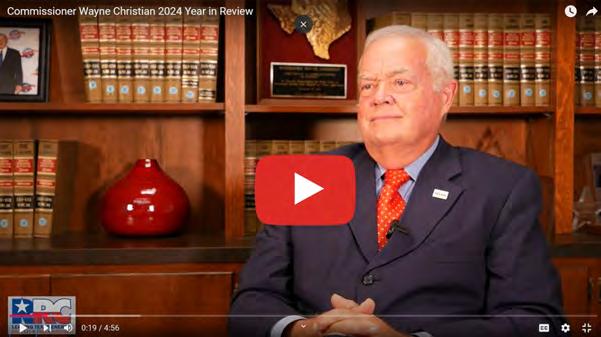
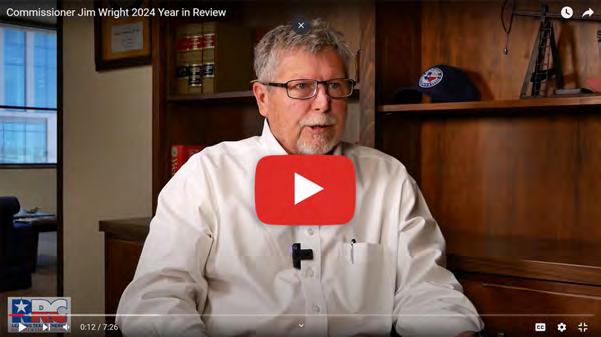
CHAIRMAN CHRISTI CRADDICK

COMMISSIONER WAYNE CHRISTIAN
COMMISSIONER JIM WRIGHT

RRC EXTENDS SUCCESSFUL ORPHAN WELL PLUGGING STREAK
RRC HIGHLIGHTED OCTOBER ENERGY AWARENESS MONTH
RRC’S DIGITALLY IMAGED OIL AND GAS RECORDS TOP 83 MILLION
A FEW EXAMPLES OF OUTREACH IN 2024
RRC Division Highlights
OIL AND GAS FIELD OPERATIONS
PIPELINE SAFETY
PIPELINE SUPPORT/DAMAGE PREVENTION


“The performance numbers are a reflection of our staff’s dedication to serve Texas,” said Danny Sorrells, RRC Deputy Executive Director.
The Railroad Commission of Texas continued its strong track record of surpassing high standards set by the Texas Legislature to help protect public safety and the environment.
The Legislature sets annual performance measures for state agencies, and in Fiscal Year 20W24 the RRC extended its string of success meeting or exceeding those measures in regulating the oil and gas industry, intrastate pipelines, surface mining, and alternative fuels.
The annual goals the agency exceeded ranged from the number of orphaned wells plugged with state funds to the number of individuals certified who store and transport propane gas across Texas.
“The performance numbers are a reflection of our staff’s dedication to serve Texas,” said Danny Sorrells, RRC Deputy Executive Director. “We help ensure safe production and transportation of the abundant resources that Texas is blessed with, which not only helps meet the energy demand of our growing state, but national and international demand as well. The agency is also looking forward to the future as we work on implementing regulations for new energy resources authorized by the Legislature.”

Legislative goals the RRC exceeded in Fiscal Year 2024 include:

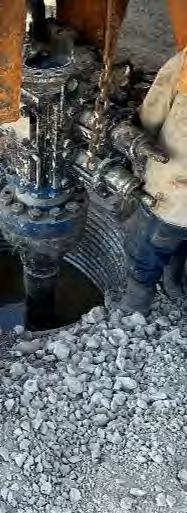

January of this year marked the end of an extensive project in the Railroad Commission’s efforts to protect environmental and public safety in West Texas.
The RRC completed plugging a well that had an uncontrolled water flow in Crane County that began in December 2023.
Inspectors in West Texas were dispatched within hours of the water flow being reported, and construction almost immediately began on lined pits and berms to contain the flow and protect any threat to freshwater.
The water flow stopped, the well was cased and cemented, and freshwater zones were protected.
Water sampling suggested this may not have been an oil and gas well. The water sample had high salt content, which would not be surprising given the fact that the site is over the Salado Formation which is a salt formation.
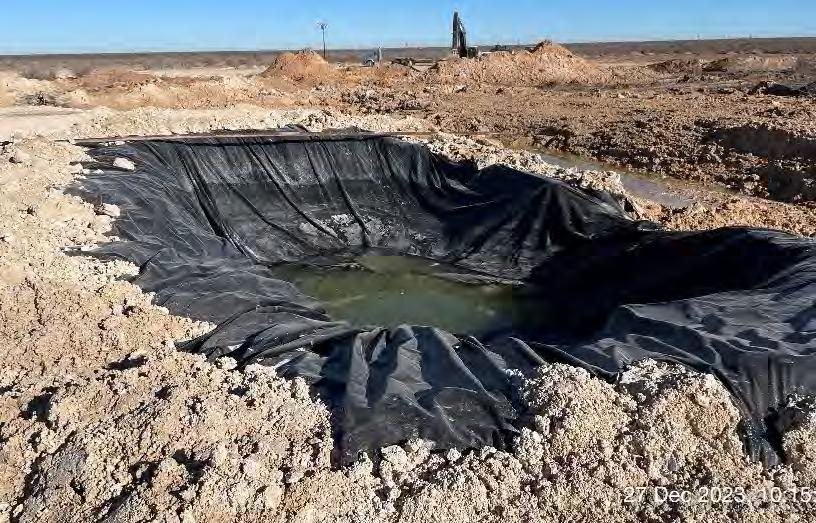
Although there is no evidence to suggest that this was an orphan oil and gas well, the RRC acted quickly to remediate the water flow in Crane County, providing yet another example of how the RRC makes every effort possible to protect freshwater in Texas.

The Railroad Commission’s well plugging program will utilize its expertise to plug hard to reach orphaned wells located along the Coastal Bend of Texas in Baffin Bay, Humble Channel and Pita Island.
The RRC signed a memorandum of Understanding with the General Land Office (GLO) in which GLO will provide $3 million to help plug 10 wells. The RRC will utilize marsh buggies and any other specialized equipment needed to reach and plug the wells.
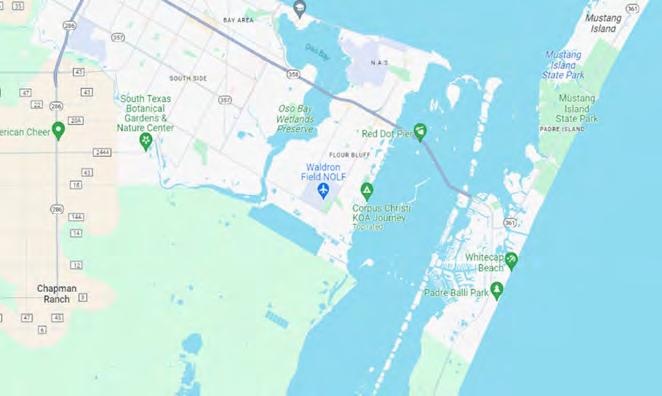

This project is an example of how the RRC uses its award-winning plugging program to assist other agencies. The Commission is currently plugging wells in Trinity Bay for the GLO, and in the past several years, has plugged a well for the GLO in the Bolivar Peninsula; helped the National Park Service by removing hazardous casing from previously plugged wells at the Big Thicket National Preserved in East Texas; and plugged wells at another popular national park, Padre Island National Seashore, in 2021.
“This year marks the 40-year anniversary of the RRC’s nationally recognized State managed Plugging Program,” said RRC Executive Director Wei Wang. “We have plugged more than 45,000 wells during that time, and our extensive experience gives us the expertise that other agencies can rely on. The RRC is always willing to help in the important mission of protecting communities and the environment around our great state.”
The RRC also exceeds high performance standards for well plugging set by the Texas Legislature. The agency has plugged more wells than the annual legislative goals for eight straight years.
The Railroad Commission activated its team for the State Operations Center (SOC) during wildfires in the Texas Panhandle this year.

to do so until the wildfire threats abated.
As is the case during any emergency, the RRC responded quickly to ensure the safety of communities and the environment. RRC staff was in direct contact
The Railroad Commission maintained communications with regulated entities in the Panhandle including gas utilities. And the agency was in contact with district office staff who were impacted in the region.



underground sources of drinking water.
The RRC requested the Groundwater Protection Council (GWPC), a respected organization of national groundwater experts, to conduct an independent peer review of its Class II Underground Injection Control (UIC) program.
Class II injection wells are used for oil and gas operations such as enhanced oil recovery, disposal of produced water (produced water is water that comes out of a well during oil and gas production), and underground hydrocarbon storage.
The GWPC is comprised of more than 30 ground water and environmental regulatory agencies in states spanning coast to coast. The GWPC conducts peer reviews of a state’s program at the request of that state; UIC programs in California, Kansas and New mexico have been recently reviewed. The RRC has been a member of the GWPC since its inception in 1983.
The GWPC’s peer reviews include, but are not limited to, an evaluation of the state’s rules, permit application
workflows, permit review criteria, protection of underground drinking water, well inspection practices, program funding, and data management.
The RRC’s UIC program has been commended by federal regulators in recent years. The Environmental Protection Agency’s annual evaluations have highlighted RRC’s strong oversight of injection wells in protecting underground sources of drinking water and our continuing efforts to mitigate seismicity in Texas.
“The RRC has had success stories with our UIC program which began in 1982,” said Paul Dubois, RRC Assistant Director of the Oil and Gas Division. “One example is the significant steps we took to help mitigate earthquakes in West Texas by setting injection limits for produced water disposal. We even leveraged artificial intelligence for that work. It’s always good to have a new set of eyes on our mission, and having other states’ experts review our program will help further strengthen our important work.”
GWPC peer reviews are in-depth, and the Texas UIC peer review could take between six months to a year to complete.
The Environmental Protection Agency (EPA) published the methane Rule in the Federal Register in early march this year; and Texas challenged this rule becaue of it’s detrimental effects on an industry that is not only vital to the state’s economy but has also made great strides in emissions reduction.

production increased more than 345 percent during the same time frame. Texas has also seen a steady decrease in gas flared; the amount of gas flared is now less than 1% of the amount of gas produced - one of the lowest rates in the country.
RRC Commissioners had voted in late January to refer the Methane Rule to the Office of the Attorney General to file a lawsuit against it; the Attorney General filed the lawsuit.
The Commission previously identified several concerns that were elaborated in comments it submitted in conjunction with the Texas Commission on Environmental Quality.
Texas leads the nation as the highest producer of both oil and natural gas, bringing thousands of jobs and economic prosperity to our great state. Reducing the production of domestic oil and gas will only force the U.S. to usher in foreign imports of these essential resources – imports from countries that do not produce a level of cleaner energy that Texas has been able to.
The RRC has taken many measures in the past few years providing incentives for emission reduction technology. The RRC established a blue-ribbon taskforce to address flaring in the state. The Texas methane & Flaring Coalition has noted that the Permian Basin in Texas reduced methane emissions
Technology and innovation work, not arbitrary and illadvised regulation, is how emissions reduction can be achieved.
“Texas is taking action against the federal government’s egregious overreach,” said RRC Chairman Christi Craddick. “The latest attack on oil and gas is nothing more than an attempt to shut down the industry that creates hundreds of thousands of jobs, funds 1/3 of our state’s economy, and produces clean and reliable energy for the world. I appreciate the Office of the Attorney General for filing suit against the EPA’s methane rule and look forward to protecting our state’s jobs and economy by providing reasonable and consistent regulation to the oil and gas industry.”
“The real victim of President Biden’s methane rule isn’t Big Oil, it will be the small oil and gas producers, who do most of the nation’s oil exploration and produce more than 83% of oil and 90% of natural gas,” said RRC Commissioner Wayne Christian. “This methane rule will target 50% of U.S. marginal wells and likely 70% of Texas’ marginal wells. Keeping these wells

and puts food on the table for thousands of Texans.”
“I applaud the Office of Attorney General for moving forward against the Biden Administration’s harmful methane rule,” said RRC Commissioner Jim Wright. “This rule is yet another attempt to harm domestic oil and gas production by forcing small, independent operators, who are the backbone of the industry and the communities they represent, out of business.”
The RRC will continue to place the safety of Texans and the protection of the environment as its highest priority, while leading the country in vital oil and gas production.

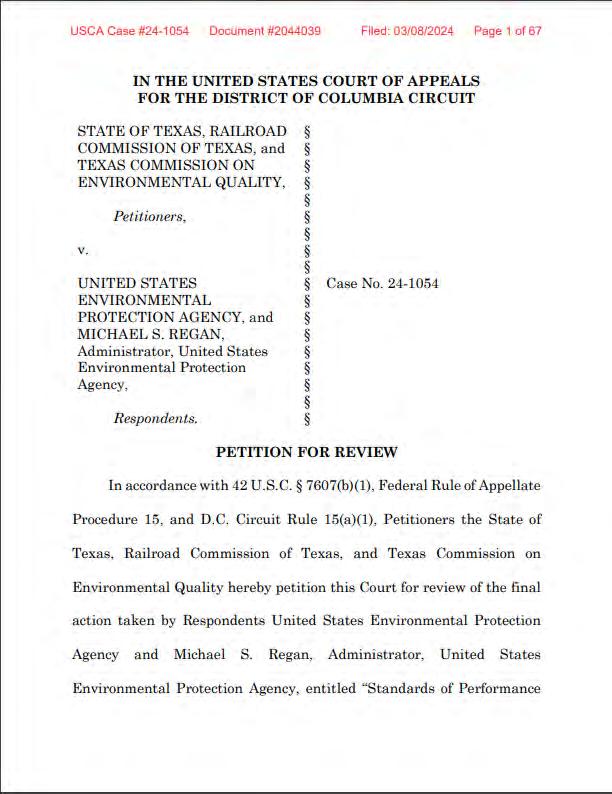


Texas joined a coalition of states challenging another onerous EPA rule this year.
The EPA’s greenhouse gas emissions rule adds regulations to existing and future electricity power plants fueled by coal and natural gas to decrease carbon dioxide emissions. However, the rule imposes strict but untested standards in what will likely result in unreasonable infrastructure costs, which could force coal plants to shut down and reduce the ability of natural gas-fired power plants to operate at full capacity.
These shutdowns can have the detrimental effect of reducing electricity supply in Texas. The reliability of the electricity grid is of utmost importance in a state that continues to benefit from population and business growth, and a reliable grid is also needed to protect Texans during summer and winter weather fluctuations.
“In yet another baseless attack on the oil and gas industry, the Biden administration has proven their willingness to jeopardize the health and safety of Texans in the name of their ill-planned agenda,” said RRC Chairman Christi Craddick. “I appreciate the hard work of agency staff and look forward to the Attorney General’s action against this rule to protect Texas.”
“President Biden is hellbent on making American’s energy more expensive and less reliable just to virtue signal to his radical environmentalist friends and his globalist allies,” said Commissioner Wayne Christian. “These rules are an EPA ultimatum to fossil fuel-based power producers: eliminate CO2 or we’ll eliminate you.
If Biden’s successful with his ‘Unreliable Power Plan,’ it will only mean more taxpayer-subsidized wind and solar energy, less dispatchable power for U.S. energy grids, and potential blackouts across the country. I hope Attorney General Paxton is successful in overturning this horrible rule.”
“This rule is but another example of the Biden Administration’s concerted effort to limit energy production at the expense of the American consumers.” said Commissioner Jim Wright. “This latest action by the EPA will not only make our electrical grid less reliable, but it will result in higher energy costs for American households. The only thing “green” about this rule will be the money flying out of middleclass pockets to pay their electricity bill if it isn’t overturned.”
The RRC and Texas Commission on Environmental Quality had filed comments opposing the rule when it was first drafted.

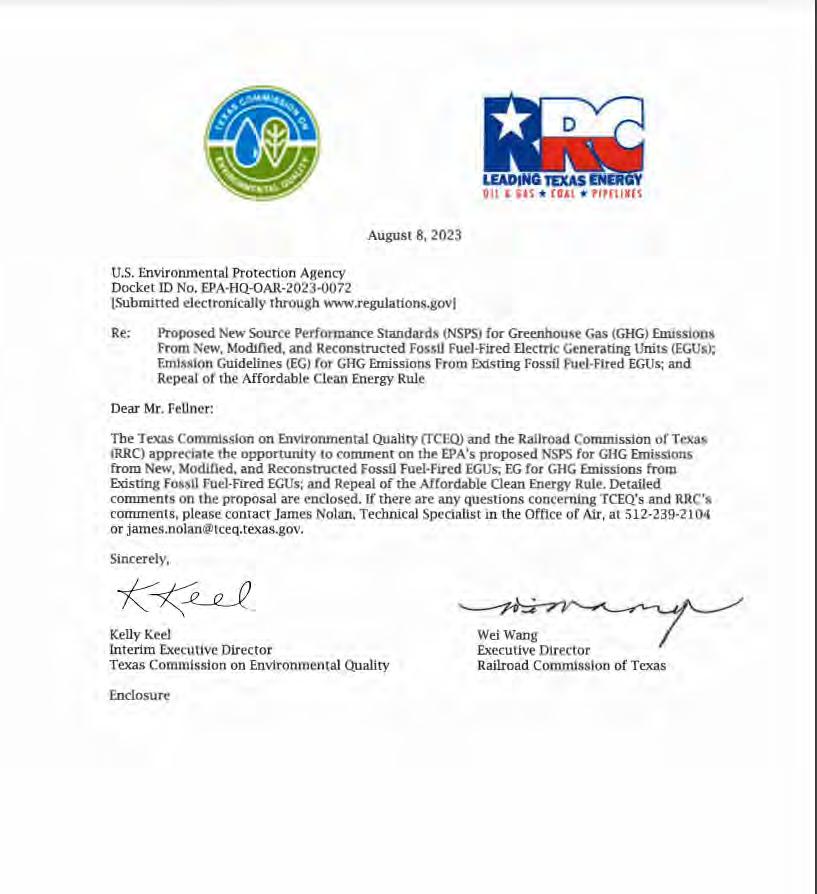
Despite numerous concerns relayed by Texas, the U.S. Fish and Wildlife Service listed the Dunes Sagebrush Lizard (DSL) as an endangered species.
The listing’s impact on the most vital oil producing region in the nation – the Permian Basin – could be devastating, and RRC commissioners are taking steps to prevent that.
At an open meeting early this summer, commissioners voted unanimously to request the Texas Attorney General’s office to challenge the ruling.
The DSL’s habitat is in the Permian Basin, which has more than 7,000 producing oil and gas fields in Texas. The endangered species listing will force operators to limit activities and could prohibit future development of energy operations.
In comments submitted last year, the RRC pointed out the Service’s speculative conclusions that the DSL is at risk of extinction were based on outdated scientific studies that do not reflect modern oil and gas production technology. In addition, the RRC expressed concern that the Service did not base its determination utilizing actual populations of the DSL, but rather relied on habitat modeling.
Also of great importance is the disregard of a major DSL conservation measure taken in Texas through a public-private partnership. Stakeholders, including state agencies, oil and gas operators and landowners
launched the Texas Conservation Plan in West Texas which significantly protects the lizards by establishing methods that prevent incidental destruction of DSL habitat during oil and gas operations.
“The Biden administration doubled down on their attack of the oil and gas industry with their latest Endangered Species Act action,” said RRC Chairman Christi Craddick. “By ignoring the existing conservation plans made by state and industry leaders to protect potential Dunes Sagebrush Lizard habitat, the administration makes it clear that this is nothing more than a political game. I am proud to push back against these unscientific and irresponsible regulations and appreciate the Office of Attorney General for supporting our efforts.”
“This doesn’t have a thing to do with ‘saving lizards’; it’s about shutting down U.S. oil and gas production to win political brownie points, which will only increase inflation and jeopardize billions of lives globally,” said RRC Commissioner Wayne Christian. “It doesn’t matter if it’s a lizard, a chicken, a whale, or a unicorn, radical environmentalists won’t be satisfied until we all get out energy from firewood and are living in a cave again. To them, this is about ending fossil fuels to ‘better humanity’; which is ironic given fossil fuels allow mankind to flourish by powering 80% of the globe’s energy, manufacturing 96% of consumer products, and helping feed more than half the planet.
Right now, the world needs more energy and more Texas oil and gas, and all this does is drive up prices and make it harder on consumers.”
“Texas will certainly fight this most recent weaponization, which aims to shut down half the nation’s crude oil production and one-third of its natural gas production,” continued Christian.
“Texans can rest assured that the RRC and other state agencies won’t lift a finger to help with this nonsense, because the Texas Energy Independence Act prohibits state agencies from facilitating any effort that would undermine Texas oil and gas production.”
“President Biden and his administration care more about reptiles and junglefowl than they do about the energy needs of our nation,” said Commissioner Jim Wright. “If they cared half as much about single mothers struggling with rising inflation and higher energy bills as they care about this lizard, a lawsuit wouldn’t be necessary.”

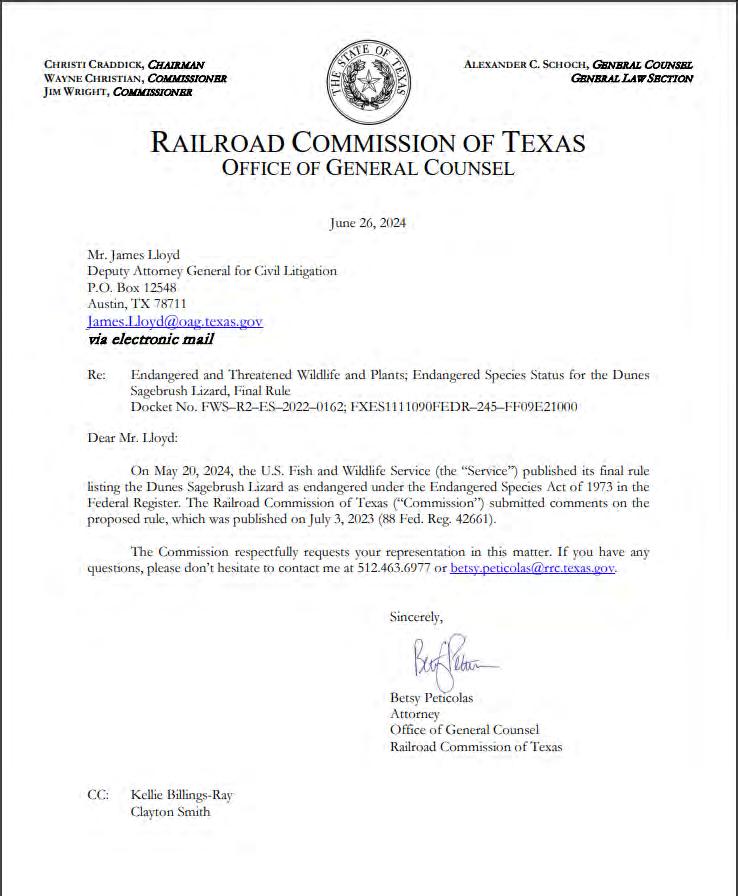
RRC commissioners approved the agency’s Fiscal Year 2025 Oil and Gas monitoring and Enforcement Plan in June, which included information to provide the public further insight on the agency’s work to protect the environment and Texans.
The annual plans define the RRC’s strategic priorities for monitoring oil and gas activities and enforcing regulations across the state. They include the agency’s extensive field operations activities such as well inspections, orphaned well pluggings, and site remediations.
New to this year’s plan is information related to technical permitting, and RRC monitoring and enforcement activities performed by the Oil and Gas Division’s Technical Permitting and Administrative Compliance Units. One example is the compliance team established by the division in 2023 to focus on post-permitting compliance at surface waste management facilities regulated by the Environmental Permits Section.
Also, for the first time, the RRC sought public feedback this year prior to developing the plan. Some of that input was used to develop priorities for monitoring and enforcement efforts in the plan, including providing more comprehensive flaring data, and evaluating difference methods to reduce orphaned wells older than 20 years.
“We continue to utilize our staff’s expertise and the agency’s technological advancements to serve Texans and their communities,” said Danny Sorrells, RRC Deputy Executive Director and Oil and Gas Director. “The new monitoring and enforcement plan provides more information on how we plan to utilize those key resources for regulation as the Texas oil and gas industry continues to be a vital element of the state and U.S. economy.”
The Fiscal Year 2025 Oil and Gas monitoring and Enforcement Plan and a Spanish version of the plan is available below

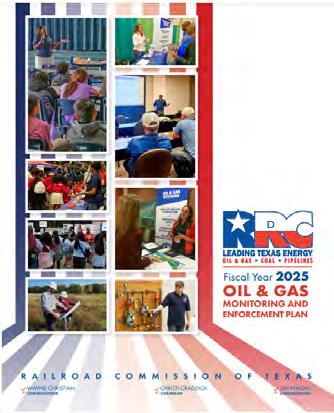
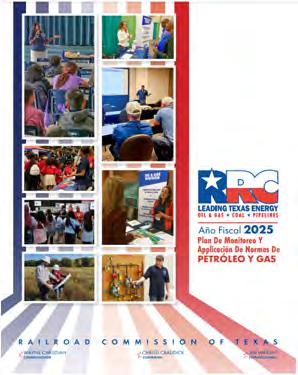


The first LoneSTAR release allows operators to make online filings for Form P-5, which are required to become, or renew as, an oil or gas operator or pipeline operator. P-5s are required in order to operate in Texas.

Other forms associated with the P-5 process can also be filed online through LoneSTAR: Form W-3C, for Certification of Surface Equipment Removal for an Inactive Well; and Form W-3X, the Application for an Extension of Deadline for Plugging an Inactive Well.
LoneSTAR gives operators the ability to monitor the P-5 approval process online, fix any compliance issues related to filings in real-time, and view records online.
The project not only reduces the extensive paperwork that operators were once required to send, it also streamlines the day-to-day review process by RRC staff.
“Overhauling the IT system at the Railroad Commission has been a top priority for me since I was first elected,” said RRC Chairman Christi Craddick. “The LoneSTAR launch marks a significant advancement to the way the agency interacts with
out bureaucratic forms and more time drilling for the reliable energy our state, nation, and world need,”
said RRC Commissioner Wayne Christian. “The Commission is widely recognized as a global leader in energy regulation, and as Commissioner I want to make sure it retains that reputation by minimizing the regulatory burden on producers and building a 21st century agency that’s the envy of the world. I want to congratulate and thank all the RRC staff that worked so hard on this project.”
“Innovation spurred the shale revolution, but it was efficient operations that ultimately resulted in America becoming the leading energy producer in the world,” said RRC Commissioner Jim Wright. “The launch of LoneSTAR will not only serve to improve our effectiveness here at the Railroad Commission, but will also reduce the paperwork burden for our Texas energy producers, allowing for greater efficiency in their dayto-day operations.”
Future releases of LoneSTAR will include other oil and gas and environmental permitting processes.
Following extensive reviews of public comments and stakeholder input, in December the Railroad Commission adopted a significant overhaul of rules regulating oil and gas waste management facilities in Texas.
The regulations cover waste from oil and gas operations, such as rock and other material pulled up from the ground during drilling, as well as waste from other operations for which the Legislature has given the RRC jurisdiction including geothermal, carbon sequestration and brine mining wells.
It is the first overhaul of RRC’s waste management rules in four decades. The new rules help the RRC continue to safeguard groundwater and surface water while adapting to modern waste management practices, such as recycling produced water, and recent advancements in production methods.
The rule updates requirements on the design, construction, operation, monitoring, and closure of waste management units, and will improve the Commission’s ability to track and collect data on oilfield waste transported throughout Texas.
The new rules also codify informal guidance that RRC experts have developed over the course of several decades to give operators and the public certainty on how regulations of waste management facilities are carried out.

The adopted rules will enhance the RRC’s oversight of waste management facilities. The agency now has staff dedicated to environmental permit compliance – a team that reviews waste management facility reports and inspections, and follows-up on those reviews to quickly rectify any issues.
“The oil and gas industry has evolved dramatically since the 1980s. After a years-long process, and with thoughtful and thorough deliberation from the public, agency experts, and industry stakeholders, I am proud to report the Railroad Commission has passed its first overhaul of waste management rules in 40 years,” said Chairman Christi Craddick. “I sincerely appreciate our staff for their hard work in modernizing our agency’s rules to reflect current waste management practices and new advancements in production methods, allowing industry to continue driving economic growth while upholding our commitment to protecting public safety and the environment.”
“It’s been 40 years since these rules were last updated, and the oil and gas industry has grown and changed in ways unimaginable from back then. Updating these regulations was a slow and deliberate process, ensuring we listened to everyone impacted – small operators, landowners, royalty owners, and waste management companies,” said Commissioner Wayne Christian. “I personally hosted meetings with small and mid-sized producers, who shared real concerns about the initial

draft, especially regarding pits. We took their feedback seriously, revised the rules and created a version that protects small businesses while safeguarding our environment. The final draft received overwhelming support from industry stakeholders, with opposition coming almost exclusively from radical environmental groups whose ultimate goal is to shut down oil and gas in Texas. This is a win for Texas energy and for commonsense, balanced regulation.”
“By passing this measure today, the Railroad Commission and the State of Texas have taken a significant step forward to align our practices and procedures to account for the considerable changes the industry has experienced in the 40 years since this rule was last reformed,” said Commissioner Jim Wright.
“Thanks to the tremendous effort and dedication of our staff here at the Railroad Commission and the input and participation of the public and stakeholder groups, we have been able to modernize these rules in a way which aligns with the Railroad Commission’s mission, and which will serve our state and citizens well.”
Texas has been at the forefront of energy regulation and innovation for more than a century, and the RRC has adopted new rules to administer legislation in the geothermal energy front in Texas.
Senate Bill 786 transfers regulatory authority of closed-loop geothermal injection wells from the Texas Commission on Environmental Quality to the Railroad Commission, allowing the RRC jurisdiction and permitting authority for these types of wells.
The new rules specifically address shallow closed-loop geothermal systems, including the associated injection wells, which are used to heat or cool buildings without conversion to electricity.
The RRC is the primary agency that has oversight of injection wells, and transferring regulatory authority for shallow closed-loop geothermal injection wells to the Commission will streamline the process for operators who want to drill and operate geothermal injection wells of this type. The rules require engineering and infrastructure safety measures to ensure protection of groundwater.
Texas has an edge over other states in another energy source: hydrogen. After nearly a year of extensive analysis, the Texas Hydrogen Production Policy Council (Council) has delivered a report to the Texas Legislature outlining actionable steps to bolster Texas’ leadership in the hydrogen industry.
The 11-member Council, established by the Legislature and chaired by RRC Chairman Christi Craddick, was tasked with making recommendations to lawmakers on updates necessary for the oversight and regulation of production, pipeline transportation, and storage of hydrogen.
The hydrogen industry is already well-established in Texas, primarily serving the petrochemical and refining industries. For over 50 years, hydrogen has been produced in dozens of facilities throughout the state. Pure hydrogen pipelines, extending over 1,000 miles, have been operating safely in Texas, supporting the industry’s robust infrastructure.
Texas’ existing hydrogen infrastructure and comprehensive regulatory framework for safety and environmental compliance have contributed to the state’s current standing as a global leader in conventional hydrogen production.
While the report recommends that Texas leverage its existing regulatory structure to lead the charge on hydrogen policy, it also specifies areas where there is room for enhancement or a need for new frameworks. Examples include leak detection requirements specifically for hydrogen, and additional rules to address hydrogen infrastructure, such as pipeline and casing materials, separately from infrastructure used for other products.
The report also highlights the potential economic opportunities tied to hydrogen industry growth for Texas. Expanding hydrogen production could enhance manufacturing and electricity generation while supporting increased production of a low-cost, reliable hydrogen energy supply. This expansion would not only support job growth, but would also underpin infrastructure development and direct investment, leading to an increase in the state’s Gross Domestic Product.
The Council is planned to continue until January 1, 2030, and the recommendations in the report are expected to be reviewed and modified as technologies, markets, and hydrogen regulations evolve.
The members of the Texas Hydrogen Production Policy Council are as follows:
RRC Chairman Christi Craddick; Richard Fenza (Air Liquide); Preston Kurtz (Air Products & Chemicals); Nigel Jenvey (Baker Hughes); Keith Wall (CenterPoint Energy); Ian Lindsay (Chevron New Energies); Angie Murray (Enterprise Products); Brian Weeks (GTI Energy); Jeffrey Pollack (Port of Corpus Christi Authority); Brian Korgel (University of Texas at Austin); Kelsie Van Hoose (Williams Companies).
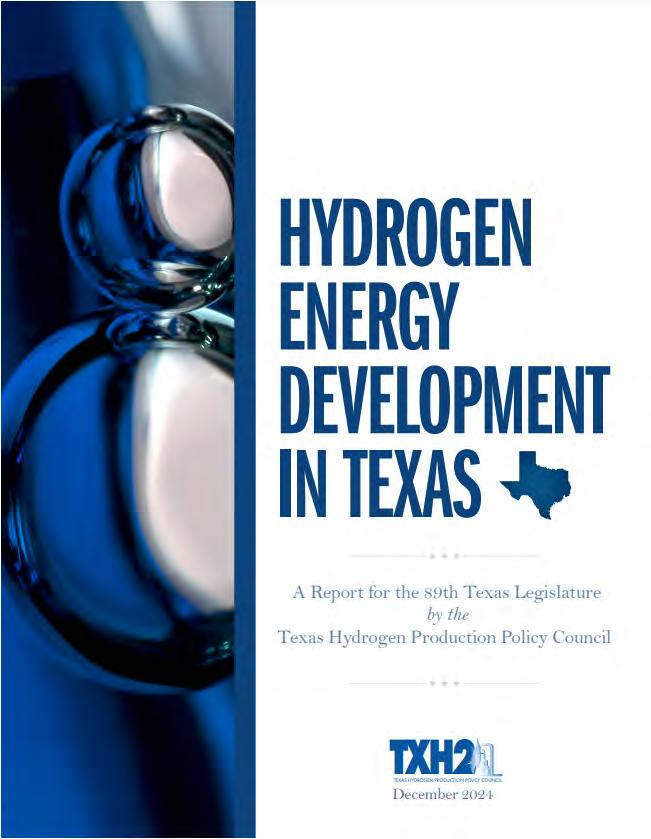




The final numbers were tallied, and the Railroad Commission plugged 1,012 orphan wells in Fiscal Year 2024 using state funds. This exceeded the fiscal year’s goal of plugging 1,000 wells with state funds, making it the eighth year in a row in which the RRC has surpassed its legislative target!
State funds that are used by the RRC to plug wells are from oil and gas industry revenue, including, but not limited to, well plugging reimbursements, fees and bonds or other financial securities paid by the industry.
“We continue to be a national leader in addressing orphaned wells,” said Danny Sorrells, RRC Deputy Executive Director and Oil and Gas Director. “Our extensive well plugging experience dates to 1984, and elements of our program, such as a prioritization system that ensures high-risk, high-priority wells are plugged, have been copied by other states. The design of RRC’s plugging program and our dedicated staff help us quickly work to protect groundwater around the state.”
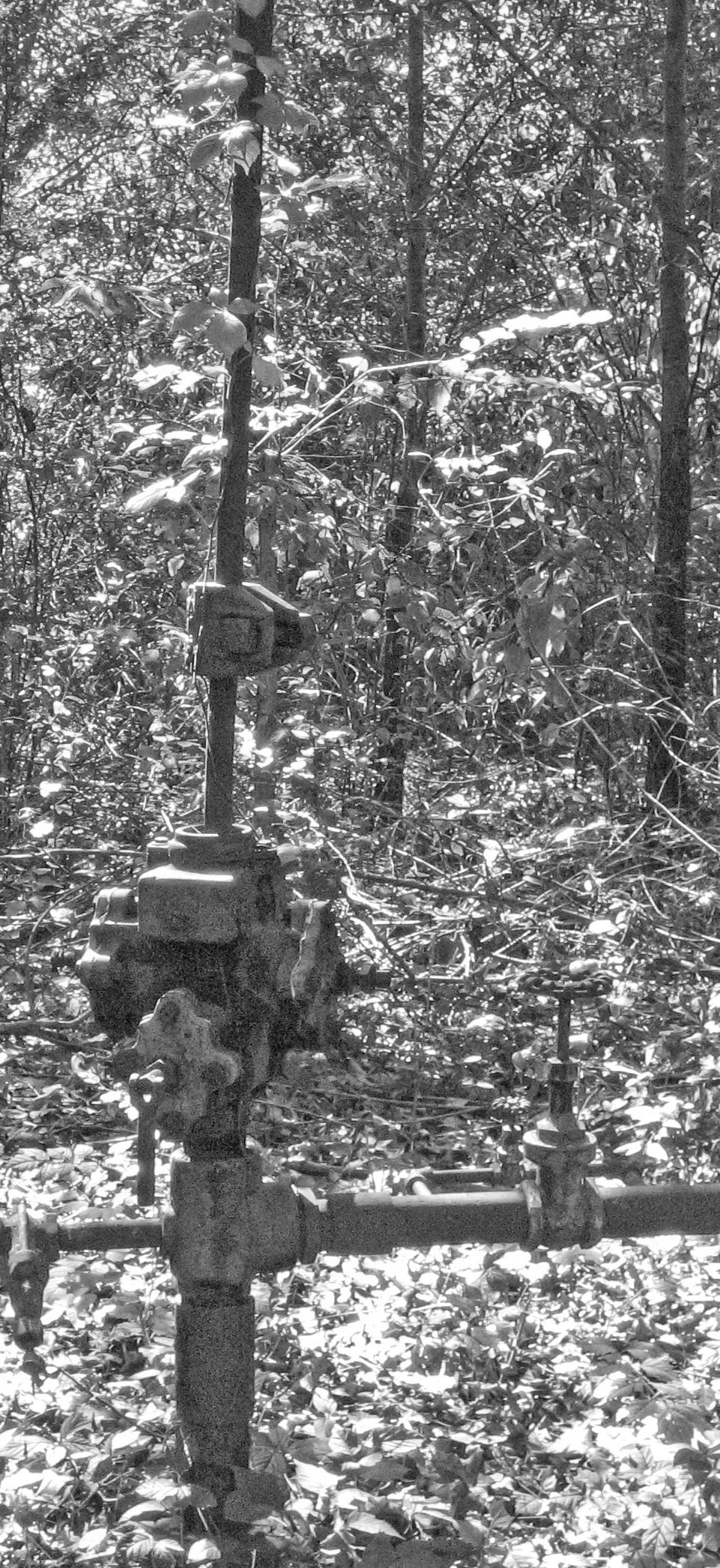

Watch this video from the field to see more on how the RRC’s decades of well plugging experience helps protect Texas communities and the environment.
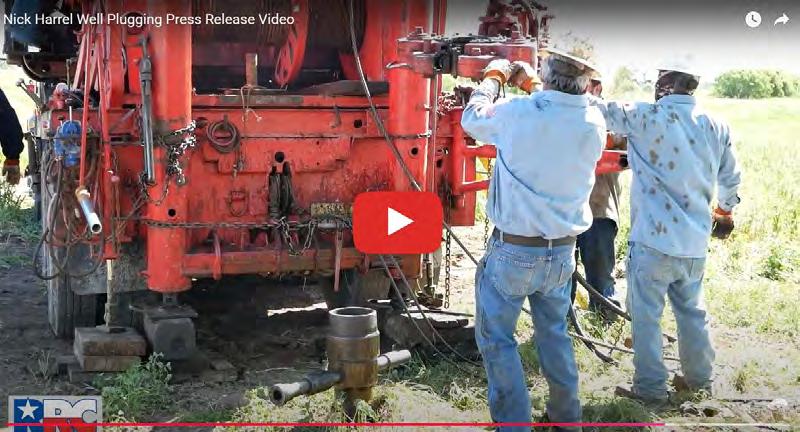

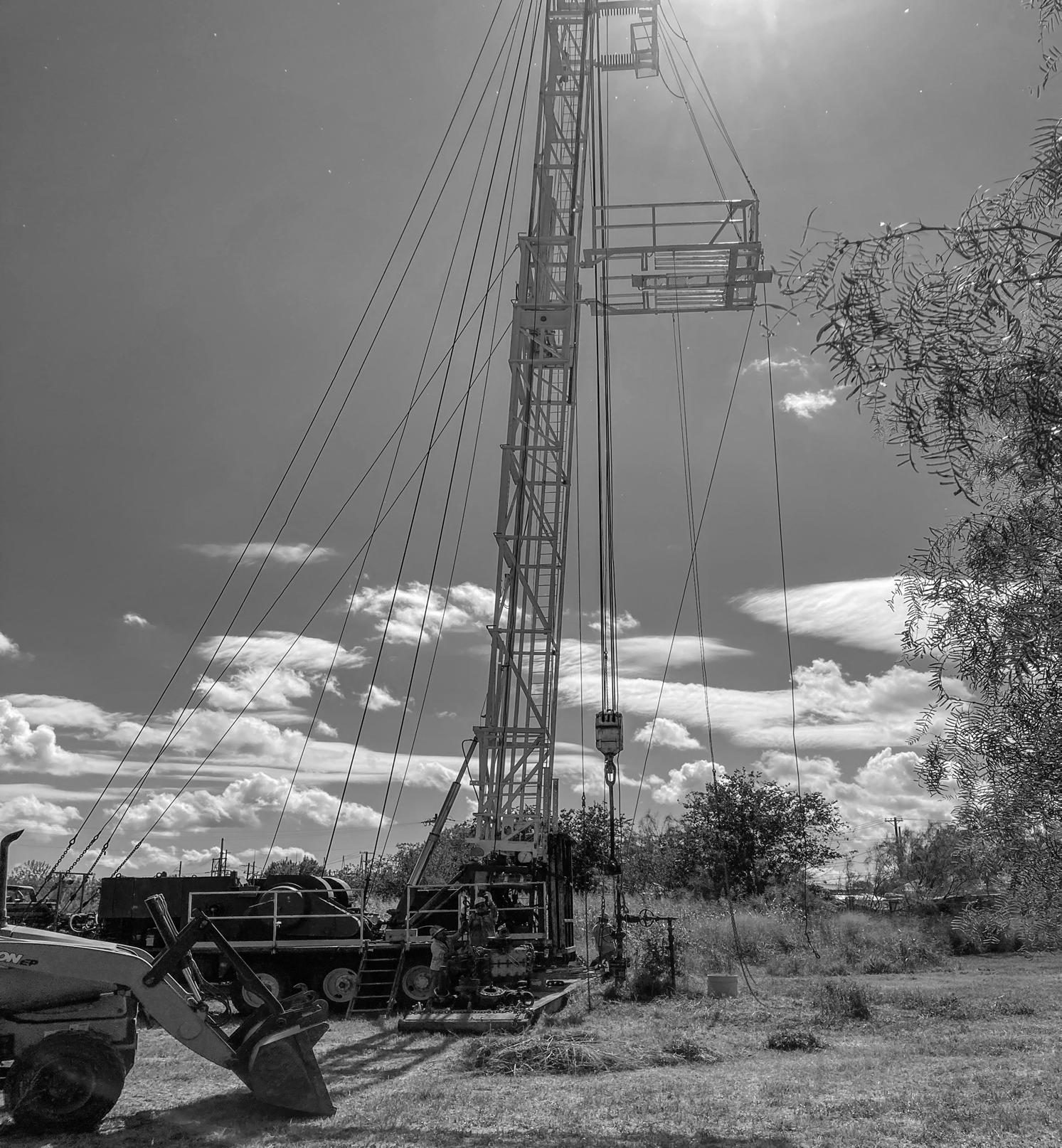
For more than three decades, National Energy Awareness month has been celebrated in October to highlight the importance of the nation’s energy resources and the need for the sustainable management of those resources.

Since the Industrial Revolution, fossil fuels have made our modern world possible by producing nearly 80 percent of global energy. Produced hydrocarbons play a crucial role in our lives, from providing fuels for transportation, electricity and heating to manufacturing everyday consumer materials like plastics, medicine, medical devices, fabrics, fertilizers and other byproducts of oil refining, such as asphalt for roads.
As the regulator of the largest oil and gas producing state in the nation, the Railroad Commission plays a vital role in the stewardship of natural resources and in ensuring public safety, while supporting the state’s long-term economic vitality in the energy landscape. Examples of that RRC mission are many.
Take gas flaring in the state as one example. Despite a record year for oil and gas production in 2023, Texas saw a significant reduction in its flaring rate at facilities. The Commission has taken concrete steps to reduce flaring by tightening procedures to flare gas, providing incentives for using flaring reduction technologies, and requiring operators to provide specific justification for their need to flare. The numbers bear witness to those steps. Since June 2019,
the flaring rate in Texas, which is the percentage of the amount of gas flared compared to the amount of gas produced, has dropped by 63 percent. According to data from September 2024, the flaring rate was under one percent, meaning that more than 99 percent of gas produced in the state was being beneficially used!
Another energy-related issue the RRC has recently tackled head on is that of seismic activity possibly caused by underground injection of produced water, a byproduct of oil and gas production, into disposal wells. While this disposal process is vital to production, the RRC has leveraged modern technology to mitigate seismic risks. The agency now employs automation and machine learning to help staff with seismic reviews in the permitting process for disposal wells. A machine learning algorithm helps manage the large volume of information that needs to be processed, which allows technical analysts to perform their jobs more efficiently.
These are a few examples of how the RRC, which has regulated the oil and gas industry for more than a century, seeks innovative ways to protect Texas.
“Texas is the national leader in energy production,” said Chairman Christi Craddick. “Energy Awareness month is a great opportunity to highlight the positive impact this industry has on Texas, the U.S., and the world. I’m proud to lead the regulatory agency that provides responsible and reasonable regulation to

the oil and gas industry and look forward to Texas continuing to lead in this critical field.”
“most Texans don’t realize the immense value of our state’s oil and gas production which powers more than just the state, it fuels the nation and world,” said Commissioner Wayne Christian. “According to the Texas Oil and Gas Association, if Texas were its own nation, the Lone Star State would be the third largest producer of natural gas and the fourth largest producer of oil. If America wants low power costs, energy independence and geopolitical stability, it will need federal policies that encourage a robust oil and gas sector and enable exports of that reliable energy to the rest of the world. So long as the need for reliable energy continues to grow with the developing world, ‘Texas Tea’ will always be there to quench that thirst.”
“Texas natural resources not only power the diverse economy of our state, they also provide the fuel necessary to maintain U.S. energy independence and support the growing energy needs of our friends and allies across the globe,” said Commissioner Jim Wright. “Access to affordable, abundant energy resources like those produced here in Texas is a blessing which, too often, is taken for granted. That is why it is important that all Americans recognize the valuable contributions hydrocarbons play in our everyday lives and the important work being done by the Railroad Commission to keep Texas energy on track.”


With more than 15 million records digitized in the past year, the Railroad Commission of Texas now has more than 83.4 million oil and gas records that can be searched and viewed online from anywhere in the world.
The enormous amount of work is part of the RRC’s ongoing success increasing transparency and making the vast trove of information held at the agency easily available to the public.
As the oldest regulatory agency in Texas, the RRC has oil and gas records dating back to the 1930’s on paper in district offices and on microfilm. The agency has been digitizing those records and placing the images online for several years, allowing anyone with internet access to view them.
Documents that have been digitized include oil and gas production records and well completion records that contain information such as well depths and producing fields of a well. These records are used often by researchers, landowners, royalty owners, energy companies and public information requesters.
“Putting millions and millions of oil and gas records online is a win-win for the public and the agency,” said Danny Sorrells, RRC Deputy Executive Director. “Not only does it give the public easy access to historical information dating back almost 100 years, but our staff can now devote the time they would have spent tracking those records for the public for other tasks at the agency.”
District office paper records and microfilm records that have been digitized can be found on the RRC website.



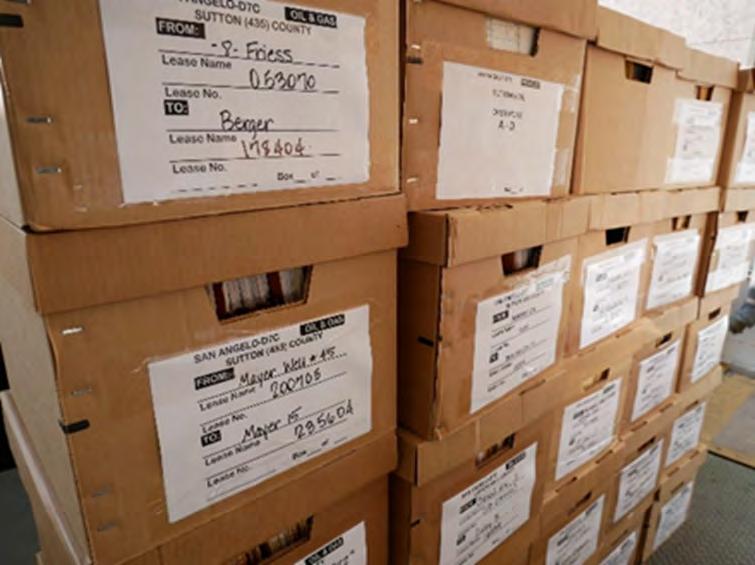
RRC District Office paper records transported for digitization
The RRC has emphasized public outreach over the last couple of years to help inform residents around the state about what we do and the importance of our work for their safety. This outreach is especially valuable in a state with annual population growth and a booming energy industry.
Staff from the Office of Public Engagement and other divisions covered large events, meetings with local officials and educators. RRC staff presented at 67 speaking engagements to a total of 7,350 attendees, and managed 40 exhibit booths at conferences and events reaching a total of more than 21,065.
Michelle Banks, Director, Office of Public Engagement, was joined by Ron Perez and mario Solis, Oversight & Safety – Corpus Christi in Sinton, TX to meet with the Chamber of Commerce. The Chamber also invited their mayor and other city leaders to attend, and it provided a great opportunity to educate about the work and mission of RRC.

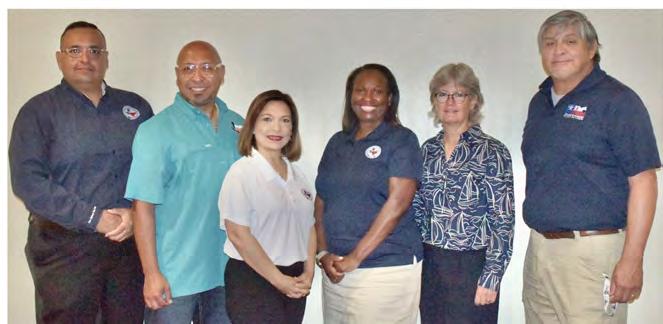
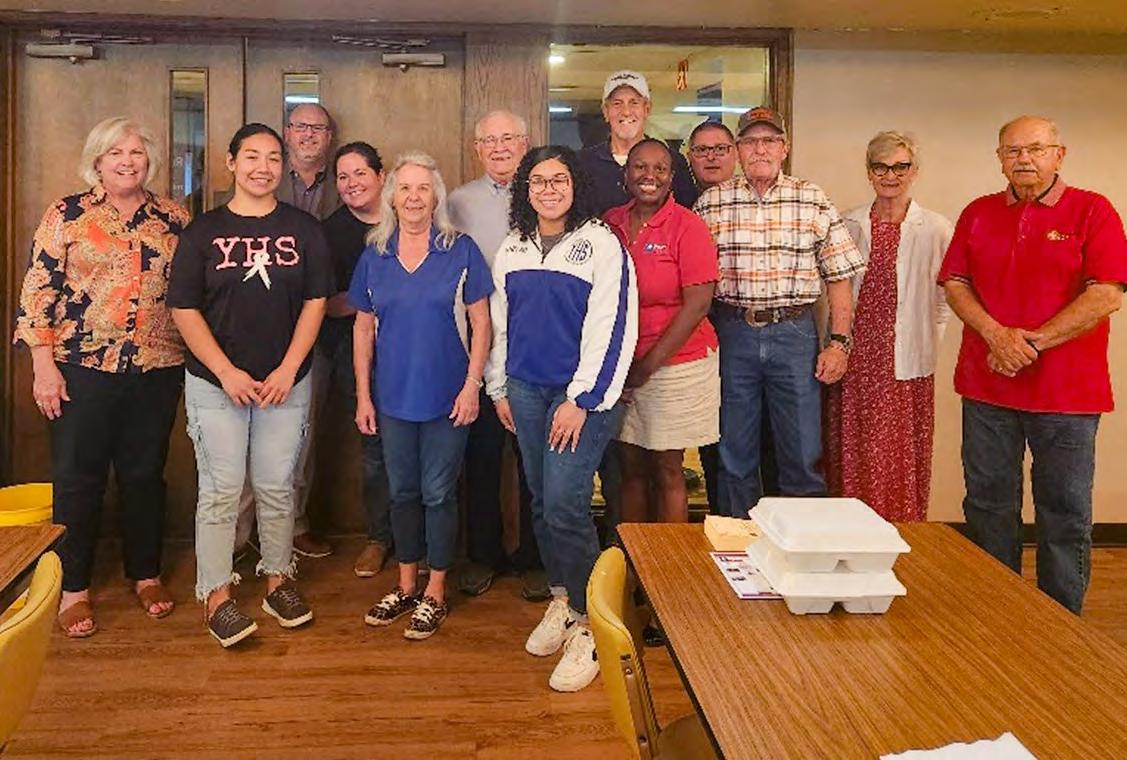

The Office of Public Engagement and Danielle Curtis from the San Antonio Field Office presented to the Yoakum Rotary Club. This was another great opportunity for the RRC to inform community leaders of our work and mission. Communities across the state are already being contacted for further speaking engagements in 2025.


Pipeline Damage Prevention staff attended the Sunbelt Builders Show in Fort Worth. This event is one of the best opportunities to be in front of contractors, builders and remodelers and remind them of the importance of pipeline damage prevention practices during construction or other activities. This annual event draws a crowd of nearly 2,000 attendees and is billed as the largest event of its kind in the nation.
Our outreach efforts are also geared towards educating the younger generation of Texans, with school visits or even discussions with teachers.
In November, staff with the Office of Public Engagement attended the Conference for the Advancement of Science Teaching (CAST) in San Antonio. The Office of Public Engagement has partnered with the Hildebrand Department of Petroleum and Geosystems Engineering at UT Austin to provide educational resources for K-12 students and their teachers. This conference allowed us to meet science teachers from across the state and discuss ways to promote oil and gas education in Texas. One resource that resonated with educators was the public Geographical Information System (GIS) Viewer scavenger hunt that our agency created, which directly aligned with state science curriculum standards requiring high school students to become proficient with tools such as GIS for scientific and engineering practices. The interaction at the conference led to numerous invitations for agency outreach to students including career fairs and STEm events.
Number of oil and gas well and facility inspections performed: 461,852 �
Average number of oil and gas well and facility inspections performed by district office staff: 2,464 �
Percent of Wells not inspected in last five years: 0�66% �
Total well population inspected: 50% �
Number of orphaned wells plugged with the use of state managed funds: 1,256 �
Number of abandoned pollution sites investigated, assessed, or cleaned up with the use of state managed funds: 417�
Drilling Permits processed = 12,163

Average Time for Drilling Permits to be Processed: 2 �7 days
Pipeline Safety continued its focus on program inspections and new construction inspections, while ensuring standard comprehensive inspection intervals were maintained exceeding its total inspection goal for FY 24.
Number of pipeline safety inspections: 4,673
Average number of pipeline field inspections per field inspector: 95

The Pipeline Damage Prevention Program continued seeing positive outreach results. Damage Prevention’s efforts reached more than 2,500 attendees, which included Excavator Safety workshops throughout the state, to larger expos like the Sunbelt Builders Show and Tx811 Damage Prevention Summit.
Industry stakeholders and the Pipeline Damage Prevention Program’s combined outreach efforts positively affected the number of damages reported, dropping from 11,080 reported in FY 2023, to 10,590 for FY 2024 �
The Pipeline Damage Prevention Program issued 6,663 dockets and collected $13,626465� 50 in penalties in FY 2024.
The RRC’s pipeline permitting team processed 4,047 permit actions and collected $5,000,925�0 0 in fees this fiscal year.

Market Oversight
Number of coal mining permit actions processed: 495
Number of coal mining inspections performed: 394
Percent of coal permitting actions completed within statutory review time frames: 100%
arket Oversight Section responded to 746 customer complaints and inquiries and reviewed approximately 150,000 tariffs.
MOS Staff participated in four statement of intent rate 59 administrative gas utility filings.
Utility Audit Section
Gas Utility Tax collected for FY 2024 was $ 42,877,359.
Audits Conducted - The Utility Audit Section’s auditors conducted a total of 130 audits during FY 2024. This

43,591 - Exams/licenses/ certifications/registrations 9,618 - Exams administered
- New exempt registrations
- Certification renewals
- Registrant renewals
- Licenses issued/renewed 7,881 - Trucks registered/renewed



CID worked diligently to maintain the integrity of the state’s natural gas supply chain as Texas set a record for winter electricity demand during winter storm Heather in January.
CID continues to enhance and expand our three operating systems and has begun working on a fourth system designed to gather and provide real-time data to the Public Utility Commission during weather emergencies.
Total CI-D submissions in 2024: 79,450
Total CI-X submissions in 2024: 4,460
Emergency Operations Plans (EOP’s) reviewed: 369 of 371 (99.46%) to date, and CID provided tailored feedback to operators that filed an EOP.
Number of site inspections performed: 7,071 for FY 24 Extreme Cold and Extreme Heat cycles.
The Information Technology Services (ITS) Division of the RRC has had a busy and successful year.
The mainframe Transformation Team has made significant progress towards reaching our goal of eliminating the agency’s dependence on the mainframe.
This July, the Railroad Commission State Tracking and Reporting (LoneSTAR) portal was launched, allowing operators online filing and record viewing for oil and gas functions. This first release of LoneSTAR includes processes associated with filing a new, renewal, and record-only Form P-5, Organization Report, to become an oil and gas operator or pipeline operator under the jurisdiction of the RRC; Form W-3C, Certification of Surface Equipment Removal for an Inactive Well; and Form W-3X, Extension of Deadline for Plugging an Inactive Well. The agency’s IT modernization efforts are moving full steam ahead and making impressive progress.
The next release of LoneSTAR will be the Environmental Permitting Waste Hauler application, which will allow the Oil and Gas Environmental Permitting Support team to process new permit applications, renewal applications and amendment applications within LoneSTAR in an expedited and efficient manner.

In addition to ITS’ software development, the agency is also making positives strides in our technology infrastructure. Each fiscal year, ITS teams are involved in the Department of Information Resources (DIR)/ Shared Technology Services (STS) Disaster Recovery program. Disaster Recovery is an aspect of business continuity. This year, RRC achieved an unprecedented 100% compliance becoming the “gold standard” amongst all state agencies within the DIR/STS Disaster Recovery program.
The Public Sales Department processed 9,857 CRMS receipts in FY24 which represents $8,223,955 in
The Files Team processed 3,293,205 Day Forward documents and 882,487 documents from the district office project for a total of 4,175,692 images. The Information Services department processed a total of 15,365,692 digital images in FY24.
Since August of 2012 the RRC has imaged

The Human Resources Division grew to 11 employees in FY 24 and now falls under the agency’s Chief Administrative Officer. The division welcomed four new employees in FY 24, to include a new HR Director as well as a HR manager who oversees talent acquisition and onboarding.
During FY 24, HR’s Talent Acquisition Team expanded its participation in recruiting events by 50% over the previous year, focusing on key areas such as oil & gas job fairs, college recruiting, and veterans recruiting as well as key regions such as midland, Lubbock and Houston. Participation in these events creates opportunities for recruiting staff to meet a large pool of potential candidates face-to-face and quickly assess their skills, as well as forming networks of prospective employees and streamlining the early stages of the hiring process.


In FY 24 the Human Resources Division:
• Hired 160 new employees
• Facilitated 73 competitive promotions
• Trained 18 new managers
• Hosted Agency Overview sessions for 159 employees






